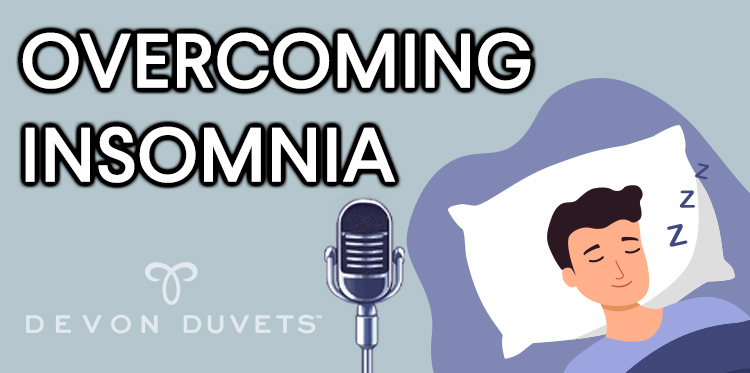Overcoming Insomnia: Tips and Natural Sleep Remedies

Are there nights where you find yourself staring at the ceiling at two in the morning, unable to switch off? This is a more common problem than most of us realise. According to The Sleep Foundation, up to 35% of adults experience symptoms of insomnia at some point in their lives.
Whilst sleeping pills may offer a short-term solution, these should always be taken under the advice of a medical professional. The good news is that there are natural, science-backed alternatives that can help. In this blog, we explore how light exposure, stress management, temperature regulation, and even the right bedding, can transform your sleep.
Why do I struggle to sleep at night?
Insomnia isn’t just about the inability to fall asleep, it’s also about staying asleep and being able to wake up feeling you’ve had a good night’s rest. The most common causes of insomnia are:
- Stress and an overactive mind
- Irregular sleep schedules
- Too much exposure to artificial light (especially before bed)
- Caffeine, alcohol, or eating too late in the evening
- Discomfort caused by temperature fluctuations
A study published in the Journal of Clinical Sleep Medicine found that blue light from TVs and devices can suppress melatonin production by up to 50%, making it harder for your body to enter a natural sleep cycle.


How can I naturally improve my sleep and beat insomnia?
Get More Natural Light During the Day: Your body runs on an internal clock called the circadian rhythm and light plays a crucial role in keeping this cycle balanced.
Recent research discovered that just 30 minutes of morning sunlight can increase melatonin production at night by up to 80%. Even simple lifestyle changes, such as a gentle morning walk or sitting by a bright window can help reset your body’s sleep-wake cycle.
Manage stress before bed: One of the biggest barriers to sleep is a high level of cortisol, a hormone that is produced in the adrenal gland. Stress can trigger higher cortisol levels, which keeps the brain active and in what is known as the ‘fight or flight’ mode - preventing relaxation and ultimately sleep. Research from the American Psychological Association found that mindfulness meditation can lower cortisol levels by 31% and help to create more feelings of being calm before bedtime.
A simple breathing technique known as the 4-7-8 method can also help. Try practising this for a few minutes before bedtime, to lower your heart rate and prepare you for sleep:
- Inhale for 4 seconds
- Hold for 7 seconds
- Exhale for 8 seconds


Regulate Your Body Temperature for Better Sleep: Many people don’t realise that body temperature is one of the biggest factors affecting sleep quality. To fall asleep naturally, your core body temperature needs to drop by about 1°C, signalling to your brain that it’s time to rest. A bedroom that is too hot is also likely to trigger restless sleep.
Research has shown that sleeping in a cool room where a steady 16–18°C is maintained, improves deep sleep cycles. However, room temperature alone isn’t enough - your bedding plays a crucial role. This is where natural materials make all the difference.
Synthetic materials can trap heat and moisture, causing you to wake up as your body becomes too hot. At Devon Duvets, our award-winning individually handcrafted, 100% British wool duvets are made by expert seamstresses in our Devon-based workshops, and are moisture wicking, breathable and temperature regulating. Natural, sustainable and chemical free, they work in harmony with your body and the ambient temperature in your bedroom, to help keep you at the perfect temperature all night. They are also dust mite resistant, so if you are being kept awake because of dust mite allergens, our wool duvets are the perfect solution.
Frequently asked questions about sleep and insomnia
1. What is the best natural remedy for insomnia?
The best natural remedies for insomnia focus on resetting your sleep cycle and creating an environment that encourages rest. The most effective methods include:
- Morning sunlight exposure to balance melatonin production
- Relaxation techniques such as deep breathing and meditation to lower stress hormones
- Sleeping in a cool, well-ventilated room with breathable bedding
- Avoiding screens at least an hour before bed to prevent melatonin suppression
- Choosing natural bedding materials like those made with wool help maintainithe right temperature and reduce sleep disruptions caused by overheating.
2. How can I fall asleep faster naturally?
Establish a consistent bedtime routine and create an environment that promotes relaxation. Try:
- The 4-7-8 breathing technique to slow heart rate
- A warm bath before bed to help drop body temperature
- Aromatherapy with lavender to encourage relaxation
- Using a wool duvet to regulate temperature and prevent overheating
3. Is wool bedding better for sleep?
Wool bedding is scientifically proven to improve sleep quality. Unlike synthetic materials, wool:
- Regulates temperature naturally, preventing night sweats or chills
- Wicks away moisture, keeping the sleep environment fresh
- Is dust mite resistant and therefore ideal for sensitive sleepers
- With the right care, lasts longer and maintains its structure better than synthetic alternatives
4. Can meditation help with insomnia?
Studies show that meditation lowers stress hormones and activates the parasympathetic nervous system, which controls your body’s ability to relax and prepares you for sleep. Regular meditation can:
- Reduce cortisol and anxiety-related wakefulness
- Improve overall sleep quality and duration
- Help you fall asleep faster and experience a more restful sleep
Practising mindfulness or guided meditation for even 10 minutes before bed can significantly improve sleep over time.
If you are experiencing ongoing sleep issues, then seek the advice of your doctor or medical professional.
Ref: The Sleep Foundation, Journal of Clinical Sleep Medicine


